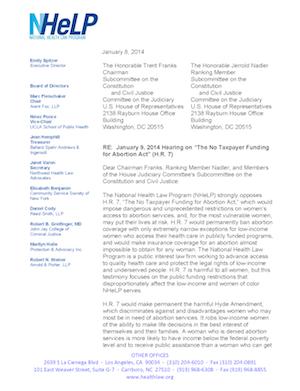January 8, 2014
The Honorable Trent Franks
Chairman
Subcommittee on the Constitution
and Civil Justice
Committee on the Judiciary
U.S. House of Representatives
2138 Rayburn House Office Building
Washington, DC 20515
The Honorable Jerrold Nadler
Ranking Member
Subcommittee on the
Constitution
and Civil Justice
Committee on the Judiciary
U.S. House of Representatives
2138 Rayburn House Office Building
Washington, DC 20515
RE: January 9, 2014 Hearing on ?The No Taxpayer Funding for Abortion Act? (H.R. 7)
Dear Chairman Franks, Ranking Member Nadler, and Members of the House Judiciary Committee’s Subcommittee on the Constitution and Civil Justice:
The National Health Law Program (NHeLP) strongly opposes H.R. 7, ?The No Taxpayer Funding for Abortion Act,? which would impose dangerous and unprecedented restrictions on women?s access to abortion services, and, for the most vulnerable women, may put their lives at risk. H.R. 7 would permanently ban abortion coverage with only extremely narrow exceptions for low-income women who access their health care in publicly funded programs, and would make insurance coverage for an abortion almost impossible to obtain for any woman. The National Health Law Program is a public interest law firm working to advance access to quality health care and protect the legal rights of low-income and underserved people. H.R. 7 is harmful to all women, but this testimony focuses on the public funding restrictions that disproportionately affect the low-income and women of color NHeLP serves.
H.R. 7 would make permanent the harmful Hyde Amendment, which discriminates against and disadvantages women who may most be in need of abortion services. It robs low-income women of the ability to make life decisions in the best interest of themselves and their families. A woman who is denied abortion services is more likely to have income below the federal poverty level and to receive public assistance than a woman who can get the service. The ban on abortion coverage in all but the very narrow circumstances of rape, incest, and life endangerment put the most vulnerable women at risk, jeopardizing their health and the financial security of their families.
Low income women, particularly low income women of color, already experience severe health disparities in reproductive health, maternal health outcomes, and birth outcomes. More than half of all women will have an unintended pregnancy and low-income women are more than twice as likely as the national average to have an unintended pregnancy. Unintended pregnancies present a public health concern as they are associated with problematic maternal and birth outcomes. African-American and Latino women have the highest unintended pregnancy rates, and relatedly, the worst maternal and birth outcomes. For example, African-American women are three times more likely than their white counterparts to die from pregnancy-related complications. H.R. 7 would exacerbate those disparities by denying women access to abortion services that may be necessary to protect their health and their lives.
Every person expects that the care they receive from their health care provider will meet established standards of care. Clinical guidelines and generally agreed upon medical practices are baseline practices that are accepted in the profession and codified in professional policies and position statements. Accordingly, several leading health professional and medical societies in the United States and Western Europe have issued accepted standards of care for reproductive health, which include providing medically accurate contraceptive information, services, and supplies, as well as abortion care. This is particularly important for women with emergent health issues and those whose management of chronic health conditions requires preconception and interconception care, which is care provided to a woman before and between pregnancies. Specifically, accepted standards of medical care advise that women suffering chronic conditions ? such as pregestational diabetes, lupus, and cardiovascular disease that could lead to adverse health and birth outcomes should avoid pregnancy until their conditions are under control. H.R. 7?s denial of funding for low-income women with these complications could mean that a woman cannot afford to receive health care that meets the appropriate standards of care, and effectively interferes with a woman and her doctor?s recommendation.
Similarly, a number of emergent medical conditions may put her or her fetus at serious risk even when a woman has decided to carry her pregnancy to term. As a result, access to safe and timely abortion services becomes critical. These conditions include but are not limited to: premature rupture of membranes, preeclampsia and eclampsia, anencephaly (fetus incompatible with life), and chronic conditions for which pregnancy termination may be medically appropriate. In these situations, accepted medical standards and guidelines from the American College of Obstetricians and Gynecologists, Royal College of Obstetricians and Gynaecologists of the United Kingdom, and the Cochrane Collaboration acknowledge that the patient must then decide to balance her health and life with the prospects of fetal survival. These standards and guidelines all recognize that a woman must make this decision. H.R. 7 deprives low-income women of the ability to make important personal life decisions about their families. Moreover, it puts at risk the health and lives of women with particular medical conditions for which pregnancy is counter-indicated.
Accordingly, we encourage the Subcommittee on the Constitution and Civil Justice, and your colleagues in the House of Representatives to protect the health of women and their right to quality and comprehensive reproductive health information and services.
Respectfully,
Emily Spitzer
Executive Director

